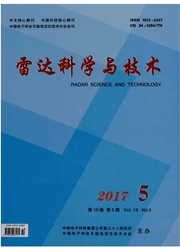

 中文摘要:
中文摘要:
杂波抑制是外辐射源雷达目标检测的一项关键技术。尤其在单频网配置下,多径杂波和地杂波相对于单发射站情况成倍增长,造成其在空域和时域均具更大扩展,使得传统杂波处理方法面临新的困难。该文研究了一种新的分载波杂波抑制方法,该方法针对带循环前缀的正交频分复用信号(CP—OFDM)所设计,能较好克服单频网配置给杂波抑制引入的新问题。文章首先阐述了该方法的原理,接着展示了其有别于传统方法的特性,包括分载波空域处理的多普勒响应和全新的主瓣杂波问题,然后从理论上研究了该方法的鲁棒性,仿真和实测处理结果验证了该文方法的有效性。
 英文摘要:
英文摘要:
Clutter rejection is a key technique used by passive radars for target detection. Especially when using Single Frequency Network (SFN) configuration, the multipath clutter and ground clutter increase several times more than during a single illuminator situation, which means that the clutter extends in both the spatial and temporal dimensions. The high amount of clutter occupies numerous degrees of freedom when conventional spatial or temporal processing is used, leading to a large array requirement, a huge computational cost, or even a complete failure. This paper investigates a novel subcarrier-based processing technique that is tailored for Orthogonal Frequency Division Multiplex (OFDM) modulation with a Cyclic Prefix (CP-OFDM) to avoid the above- mentioned predicament. The algorithm principle is initially illustrated and followed by a discussion about the unique characteristics of Subcarrier-based Spatial Adaptive Processing (SSAP), which include the Doppler response and its unusual main-lobe clutter case. Then, the robustness is researched by evaluating the performance under relaxed basic assumptions. The conclusions are demonstrated by conducting test using simulated and real datasets.
 同期刊论文项目
同期刊论文项目
 同项目期刊论文
同项目期刊论文
 Multipath Clutter Rejection for digital radio mondiale-based HF Passive Bistatic Radar with OFDM Wav
Multipath Clutter Rejection for digital radio mondiale-based HF Passive Bistatic Radar with OFDM Wav 期刊信息
期刊信息
